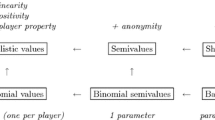Abstract
Multinomial probabilistic values were introduced by one of us in reliability. Here we define them for all cooperative games and illustrate their behavior in practice by means of an application to the analysis of a political problem.


Similar content being viewed by others
Notes
A family of values axiomatically characterized in Weber (1988) by means of linearity, positivity, and the dummy player property.
These values were introduced in reliability by Puente (2000) (see also Freixas and Puente 2002) with the name of “multibinary probabilistic values.” They were independently defined by Carreras (2004), for simple games only —i.e. as power indices—in a work on decisiveness (see also Carreras 2005) where they were called “Banzhaf \(\alpha \)-indices.”
Incidentally, the Banzhaf value gives the same allocations in this game.
A similar scheme could be applied if the relevant notion were nationalism (vs. centralism), as for example in regions like Quebec, Scotland, Padania (Po Valley), Catalonia or the Basque Country. Higher-dimensional ideological spaces might be treated in a similar but more complicated way.
The numerical example proposed below in this section shows that this bound cannot be improved, since the total power equals \(n\) in this example.
As to the additional information given by ideological constraints in politics, it is worthy of mention, at least incidentally, a singular example. In the general elections held in Greece in May 7 and June 17, 2012, the willingness of the parties to form any coalition was being, due to Greek economy’s dramatic situation, much more decisive than the ideological constraints. Our model might well apply to study this situation. The profile components after May 7 were very low and led to an impasse, whereas they increased after June 17 and gave rise, finally, to a coalition government.
References
Alonso JM, Carreras F, Puente MA (2007) Axiomatic characterizations of the symmetric coalitional binomial semivalues. Discret Appl Math 155:2282–2293
Banzhaf JF (1965) Weigthed voting doesn’t work: a mathematical analysis. Rutgers Law Rev 19:317–343
Carreras F (2004) \(\alpha \)-decisiveness in simple games. Theory Decis 56:77–91 Also In: Gambarelli G (ed) Essays on cooperative games, Kluwer Academic Publishers, 77–91
Carreras F (2005) A decisiveness index for simple games. Eur J Oper Res 163:370–387
Carreras F, Freixas J (2002) Semivalue versatility and applications. Ann Oper Res 109:343–358
Carreras F, Puente MA (2012) Symmetric coalitional binomial semivalues. Group Decis Negot 21:637–662
Carreras F, Llongueras MD, Magaña A (2005) On the convenience to form coalitions or partnerships in simple games. Ann Oper Res 137:67–89
Carreras F, Llongueras MD, Puente MA (2007) Partnerships in politics: a case study. Homo Oeconomicus 24:469–484
Dubey P, Neyman A, Weber RJ (1981) Value theory without efficiency. Math Oper Res 6:122–128
Freixas J, Puente MA (2002) Reliability importance measures of the components in a system based on semivalues and probabilistic values. Ann Oper Res 109:331–342
Owen G (1975) Multilinear extensions and the Banzhaf value. Naval Res Logist Q 22:741–750
Puente MA (2000) Contributions to the representability of simple games and to the calculus of solutions for this class of games (in Spanish). Ph.D. Thesis. Technical University of Catalonia, Spain
Shapley LS (1953) A value for n-person games. In: Kuhn HW, Tucker AW (eds) Contributions to the Theory of Games II., Annals of Mathematical Studies, vol 28. Princeton University Press, Princeton, pp 307–317
Weber RJ (1988) Probabilistic values for games. In: Roth AE (ed) The Shapley value: essays in honor of Lloyd S. Shapley. Cambridge University Press, Cambridge, pp 101–119
Acknowledgments
The authors wish to thank an editor and two anonymous reviewers for their helpful suggestions, most of which have been incorporated to the text.
Author information
Authors and Affiliations
Corresponding author
Additional information
Research supported by Grant SGR 2014-435 of the Catalonia Government (Generalitat de Catalunya) and Grant MTM 2012-34426 of the Economy and Competitiveness Spanish Ministry.
Rights and permissions
About this article
Cite this article
Carreras, F., Puente, M.A. Multinomial Probabilistic Values. Group Decis Negot 24, 981–991 (2015). https://doi.org/10.1007/s10726-014-9425-3
Published:
Issue Date:
DOI: https://doi.org/10.1007/s10726-014-9425-3




